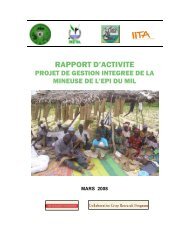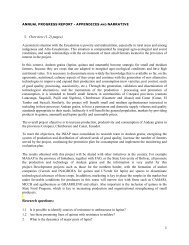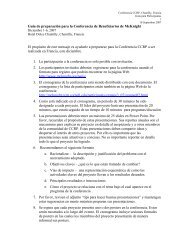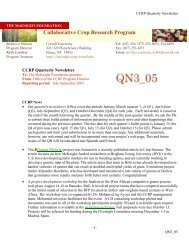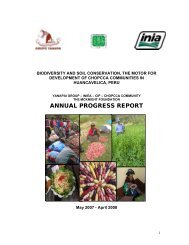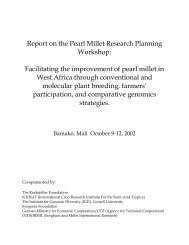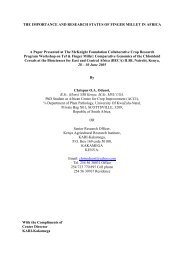English - McKnight Foundation Collaborative Crop Research Program
English - McKnight Foundation Collaborative Crop Research Program
English - McKnight Foundation Collaborative Crop Research Program
Create successful ePaper yourself
Turn your PDF publications into a flip-book with our unique Google optimized e-Paper software.
<strong>McKnight</strong> <strong>Foundation</strong> <strong>Collaborative</strong> <strong>Crop</strong>s <strong>Research</strong> Project No: 06-741<br />
Sub-Activity2.3.1.1: Train farmers to produce seed (QDS) for commercial use:<br />
Training of farmers on Seed Production (QDS) of Cowpea is very important because the crop saves<br />
many lives of people in drought prone areas of the semiarid areas where the crop is grown. The seed<br />
availability is a big issue because commercial companies are not interested in producing seed of low<br />
volume crops like sorghum, pearl millet bambaranuts and cowpea. For this reason it was embedded in<br />
the project to train farmers to produce their own seed which they can use themselves and sell to the<br />
neighbours and neighbouring villages. It is intended also that once these farmers have known the<br />
techniques of producing high quality seeds, they will later be contracted by the Agricultural Seed<br />
Agency (ASA) to produce certied seed to reach many farmers, and not within their district, but to more<br />
districts that grow the crop.<br />
Farmers were given training on the following main seed production areas:<br />
1. Organization of seed production in Tanzania (L 1): This lecture was given in order to expose farmers<br />
on the various institutions/stakeholders involved in the seed industry, where they are and what they are<br />
doing. It also intended to make them understand the seed classes produced in the country.<br />
Lecture components included the following: The roles of Agriculture <strong>Research</strong> Institutions (ARI’s),<br />
Agricultural Seed Agency (ASA), Seed companies, Farmer groups, Seed Certification Institute and<br />
Agriculture Extension Services Department, Seed production flow from ARI’s to Seed companies and<br />
to farmer groups and Seed classes recognized in Tanzania seed industry<br />
2. Attributes of seed quality (L 2): To make farmers understand the concept of seed quality and its<br />
implications in seed production, processing, storage and distribution. The lecture components included:<br />
Importance of seed as a basic input in agriculture production, Merits of improved varieties as a basic<br />
requirement for any variety before releasing to farmers and Seed quality aspects which are verifiable by<br />
already set standards by Seed Certification Institute such as genetic and physical purity, germination and<br />
seed health.<br />
3. Cowpea Seed Production (L 3): Being the core subject, farmers were trained on the techniques used<br />
in the production of cowpea seeds. More emphasis was put in the husbandry practices, which will<br />
enable them harvest high quality seed.<br />
Training components included: Land selection for cowpea seed production, Land preparation, Choice of<br />
varieties to be planted according to days to maturity, Plant spacing depending on whether a variety is<br />
determinate or indeterminate, <strong>Crop</strong> husbandry practices in general such as pest management, rouging of<br />
off types in seed production, timely harvesting, seed conditioning, safe seed storage and seed sampling<br />
and testing for quality attributes of the project should be initiated by 2010.<br />
Table 17: Summary topics covered by each Farmer <strong>Research</strong> Groups, 2009<br />
Region District Village F R G NO. of<br />
participants<br />
SINGIDA Singida<br />
district<br />
DODOMA Dodoma<br />
urban<br />
IRINGA Iringa<br />
district<br />
Topics Covered<br />
Topic Topic Topic<br />
1 2 3<br />
Msungua Mshikamano 10 X X X<br />
Ikhanoda Mfwenji 20 X X X<br />
Nduu Matumaini 21 X X X<br />
Kikombo Ushirika 11 X X<br />
Mpunguzi Twende na<br />
wakati<br />
10 X X<br />
Mkungugu Ari mpya 10 X X<br />
Mangalali Fahari 14 X X<br />
21<br />
2009



